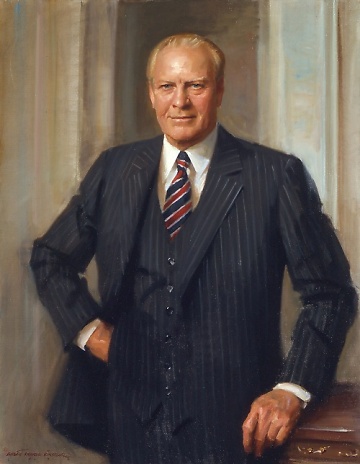 At approximately12:05 p.m. on August 9, 1974, only moments after Richard Nixon officially resigned from the Office of the Presidency, Gerald Ford took the Oath of Office and delivered his first presidential remarks in the East Room of the White House.
At approximately12:05 p.m. on August 9, 1974, only moments after Richard Nixon officially resigned from the Office of the Presidency, Gerald Ford took the Oath of Office and delivered his first presidential remarks in the East Room of the White House. After pledging to be "the President of all the people" and reaffirming his belief that "honesty is always the best policy in the end," Ford turned his attention to the Watergate scandal and said:
My fellow Americans, our long national nightmare is over. Our Constitution works; our great Republic is a government of laws and not of men. Here the people rule. But there is a higher Power, by whatever name we honor Him, who ordains not only righteousness but love, not only justice but mercy.
As we bind up the internal wounds of Watergate, more painful and more poisonous than those of foreign wars, let us restore the golden rule to our political process, and let brotherly love purge our hearts of suspicion and of hate.
In the beginning, I asked you to pray for me. Before closing, I ask again your prayers, for Richard Nixon and for his family. May our former President, who brought peace to millions, find it for himself. May God bless and comfort his wonderful wife and daughters, whose love and loyalty will forever be a shining legacy to all who bear the lonely burdens of the White House.
For the next four weeks, the new president enjoyed a high approval rating, partly because the Fords appeared to be such a normal, middle-class American family. Upon moving into the White House, Ford’s teenage daughter Susan vowed to never throw away her blue jeans. His wife Betty was down-to-earth and had a good sense of humor. And President Ford was even photographed "showing off his English-muffin-making skills" in the Family Kitchen at the White House.
Recalling Ford's fondness for English muffins and his other favorite breakfast foods, White House Chef Henry Haller wrote:
President Ford had a healthy appetite and simple tastes. For breakfast, the President usually consumed an energy rich, high carbohydrate meal that included freshly squeezed orange juice, a piece of fresh fruit such as melon, one or two toasted English muffins with margarine and jam, and hot tea.
Sunday breakfast was always a special meal in the Ford's home, however, with the President's favorite: Golden Brown Waffles served with "the works" - strawberries and sour cream.
If you'd like to make some of President Ford's favorite Golden Brown Waffles with Strawberries and Sour Cream for your next Sunday breakfast, here is the original recipe from The White House Family Cookbook by Henry Haller:
1 1/4 cups cake flour
3 teaspoons baking powder
1/2 teaspoon salt
2 tablespoons confectioners sugar
1 1/2 cups milk, room temperature
1/2 teaspooon vaniall extract
3 egg yolks
5 tabllespoons melted butter
3 egg whites room tempertaure
1 pint fresh strawberrries, lightly dusted with sugar
1 pint sour cream
Into a large mixing bowl, sift together flour, baking powder, salt and sugar. Using the back of a wooden spoon, make a deep well in the center of the dry ingredients. In a separate bowl, combine milk, vanialla, egg yolks, and melted butter. Pour rapidly into the center of the dry ingredients and combine quickly, using a whisk.
In a clean, dry bowl, beat the egg whites until stiff but not dry. Fold into batter.
Transfer batter to a pitcher for easy pouring. Heat a waffle iron to medium temperature. Pour in batter until grid is two-thirds full. Close the lid of the waffle iron and bake for 4 minutes or until steam stops emerging and waffle is golden brown. Remove gently. Repeat baking process to make five more waffles. Serve hot, accompanied by bowls of sweetened strawberries and sour cream.
FAST FACT: Although President Ford initially enjoyed high approval ratings, the mood of the nation changed dramatically on September 8, 1974, when he granted Richard Nixon a full pardon for all federal crimes he had "committed or may have committed" in the White House. The response was “a tidal wave of criticism” which all but assured Ford’s defeat to Jimmy Carter in the election of 1976. But, as time passed, critics began to see that Ford’s pardon was both noble and necessary to help the nation heal. In 1999, Bill Clinton conferred on Ford the Presidential Medal of Freedom, the nation's highest civilian honor. Ford also received the Congressional Gold Medal and was awarded the John F. Kennedy Profiles in Courage Award in 2001.
Credit: President Gerald R. Ford, Oil on Canvas by Everett Raymond Kinstler, National Portrait Gallery, Smithsonian Institution, Washington, D.C.
To learn about my new book click here
